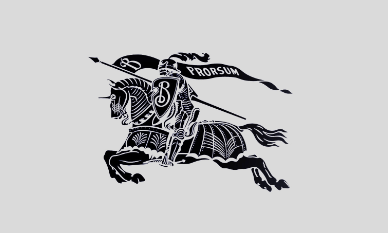Logo:2-V8mqa59ge= Burberry

The Burberry logo, characterized by its distinguished equestrian knight, serves as a compelling case study in the evolution of brand identity within the luxury fashion sector. Its historical significance reflects a rich narrative steeped in British heritage, while its design adaptations signal a responsiveness to contemporary market demands. As Burberry navigates the challenges of digital transformation and sustainability, the implications for its logo and overall brand strategy warrant careful examination. What does this mean for the future of luxury branding and consumer engagement? The answers may reveal unexpected dimensions of a well-known emblem.
Historical Significance of Burberry’s Logo
The Burberry logo, with its iconic equestrian knight, embodies a rich tapestry of historical significance that dates back to the brand’s founding in 1856.
This emblem serves not only as a marker of brand identity but also as a profound cultural symbolism, reflecting British heritage and values.
It resonates with an audience that appreciates elegance, authenticity, and the freedom of self-expression through fashion.
See also: Logo:2ta1icgkkac= Kansas Basketball
Design Evolution Over Time
Reflecting a dynamic interplay between tradition and modernity, the design evolution of Burberry’s logo showcases the brand’s ability to adapt while remaining true to its roots.
Each iteration reinforces Burberry’s brand identity through elegant visual storytelling, seamlessly merging classic elements with contemporary aesthetics.
This evolution not only captivates the audience’s imagination but also embodies the freedom and sophistication synonymous with the Burberry ethos.
Impact of Digital Transformation
Burberry’s embrace of digital transformation has significantly reshaped its brand landscape, fostering a new era of engagement with consumers.
By leveraging innovative technologies, the brand has enhanced customer engagement and cultivated brand loyalty.
This strategic pivot allows Burberry to connect with a diverse audience, providing personalized experiences that resonate, ultimately redefining luxury in a digital age and empowering consumers to express their individuality.
Future Directions for the Brand
Strategically positioning itself for the future, Burberry consistently seeks to innovate and adapt to the evolving landscape of luxury fashion.
Emphasizing sustainability initiatives, the brand is committed to reducing its environmental footprint while captivating a conscious consumer base.
Furthermore, Burberry’s global expansion strategy aims to penetrate emerging markets, ensuring that its iconic heritage resonates across diverse cultures, fostering a sense of freedom and elegance.
Conclusion
Burberry’s logo, a fusion of tradition and innovation, encapsulates the brand’s enduring legacy in luxury fashion. With over 150 years of history, it symbolizes not only British elegance but also the brand’s adaptability to changing consumer values. Remarkably, 70% of millennials express a preference for brands that demonstrate sustainability, highlighting the importance of Burberry’s commitment to eco-conscious practices. As the logo evolves, it continues to inspire a new generation seeking authenticity and individuality in their fashion choices.




